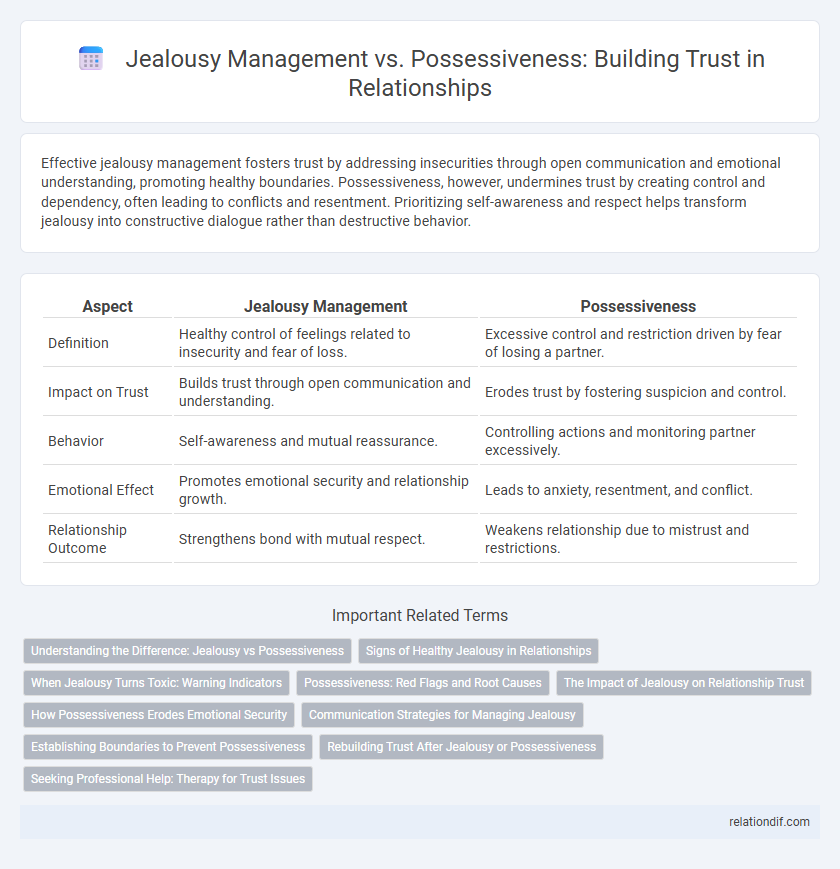Effective jealousy management fosters trust by addressing insecurities through open communication and emotional understanding, promoting healthy boundaries. Possessiveness, however, undermines trust by creating control and dependency, often leading to conflicts and resentment. Prioritizing self-awareness and respect helps transform jealousy into constructive dialogue rather than destructive behavior.
Table of Comparison
| Aspect | Jealousy Management | Possessiveness |
|---|---|---|
| Definition | Healthy control of feelings related to insecurity and fear of loss. | Excessive control and restriction driven by fear of losing a partner. |
| Impact on Trust | Builds trust through open communication and understanding. | Erodes trust by fostering suspicion and control. |
| Behavior | Self-awareness and mutual reassurance. | Controlling actions and monitoring partner excessively. |
| Emotional Effect | Promotes emotional security and relationship growth. | Leads to anxiety, resentment, and conflict. |
| Relationship Outcome | Strengthens bond with mutual respect. | Weakens relationship due to mistrust and restrictions. |
Understanding the Difference: Jealousy vs Possessiveness
Jealousy involves fear of losing something valuable, often triggered by perceived threats to a relationship, while possessiveness reflects an excessive need to control or dominate a partner. Understanding the difference is crucial for healthy trust dynamics, as jealousy can be a natural emotional response, whereas possessiveness frequently leads to relationship strain and insecurity. Effective jealousy management requires self-awareness and communication, contrasting with possessiveness that demands setting boundaries and fostering independence.
Signs of Healthy Jealousy in Relationships
Signs of healthy jealousy in relationships include feeling occasional concern about a partner's attention without obsessive thoughts or controlling behaviors. It often manifests as increased appreciation and motivation to strengthen the bond rather than resentment or suspicion. Healthy jealousy encourages open communication, trust building, and respect for individual boundaries within a committed partnership.
When Jealousy Turns Toxic: Warning Indicators
Jealousy becomes toxic when it triggers constant suspicion, obsessive surveillance, and unwarranted accusations that erode trust in a relationship. Persistent jealousy often leads to possessiveness, marked by controlling behaviors and a lack of respect for personal boundaries. Recognizing these warning indicators early helps prevent emotional manipulation and preserves healthy communication between partners.
Possessiveness: Red Flags and Root Causes
Possessiveness in relationships often signals deeper emotional insecurities and fear of abandonment, manifesting through controlling behaviors and constant need for reassurance. Key red flags include monitoring a partner's activities, restricting social interactions, and displaying jealousy disproportionate to the situation. Understanding root causes such as low self-esteem, past traumas, or attachment issues enables more effective communication and healthier trust-building strategies.
The Impact of Jealousy on Relationship Trust
Jealousy undermines relationship trust by triggering insecurity and suspicion, which can lead to frequent conflicts and emotional distance. Unlike possessiveness, which often involves control and restriction, jealousy primarily intensifies fear of loss and emotional vulnerability. Effective jealousy management fosters open communication and reassurance, preserving trust and emotional connection in partnerships.
How Possessiveness Erodes Emotional Security
Possessiveness undermines emotional security by creating constant fear of loss and triggering insecurity in relationships. It fosters an environment of control and suspicion, preventing partners from feeling trusted and valued as individuals. This erosion of trust damages the foundation of emotional safety, leading to increased anxiety and relational tension.
Communication Strategies for Managing Jealousy
Effective communication strategies for managing jealousy prioritize open dialogue and emotional honesty, fostering trust and understanding between partners. Active listening and expressing feelings without blame reduce misunderstandings and prevent possessiveness from escalating. Establishing clear boundaries and reassurance through consistent, empathetic conversations strengthens relationship security and diminishes jealousy triggers.
Establishing Boundaries to Prevent Possessiveness
Establishing clear boundaries is essential for managing jealousy and preventing possessiveness in relationships. Defining personal limits fosters trust and respect, reducing the risk of misunderstandings and emotional insecurity. Consistent communication about boundaries helps maintain a healthy balance between closeness and independence.
Rebuilding Trust After Jealousy or Possessiveness
Rebuilding trust after jealousy or possessiveness requires consistent communication and transparent behavior to demonstrate commitment and reliability. Implementing boundary-setting and actively addressing insecurities helps to repair emotional damage and foster mutual respect. Therapy or counseling can be effective in resolving underlying issues and strengthening the foundation of trust within the relationship.
Seeking Professional Help: Therapy for Trust Issues
Seeking professional help through therapy provides effective strategies for managing jealousy and reducing possessiveness, which are key to building trust in relationships. Cognitive-behavioral therapy (CBT) helps individuals identify and challenge irrational thoughts that fuel jealousy, promoting healthier emotional responses. Licensed therapists guide clients in developing communication skills and emotional regulation techniques to foster trust and improve relationship dynamics.
Jealousy management vs possessiveness Infographic

 relationdif.com
relationdif.com